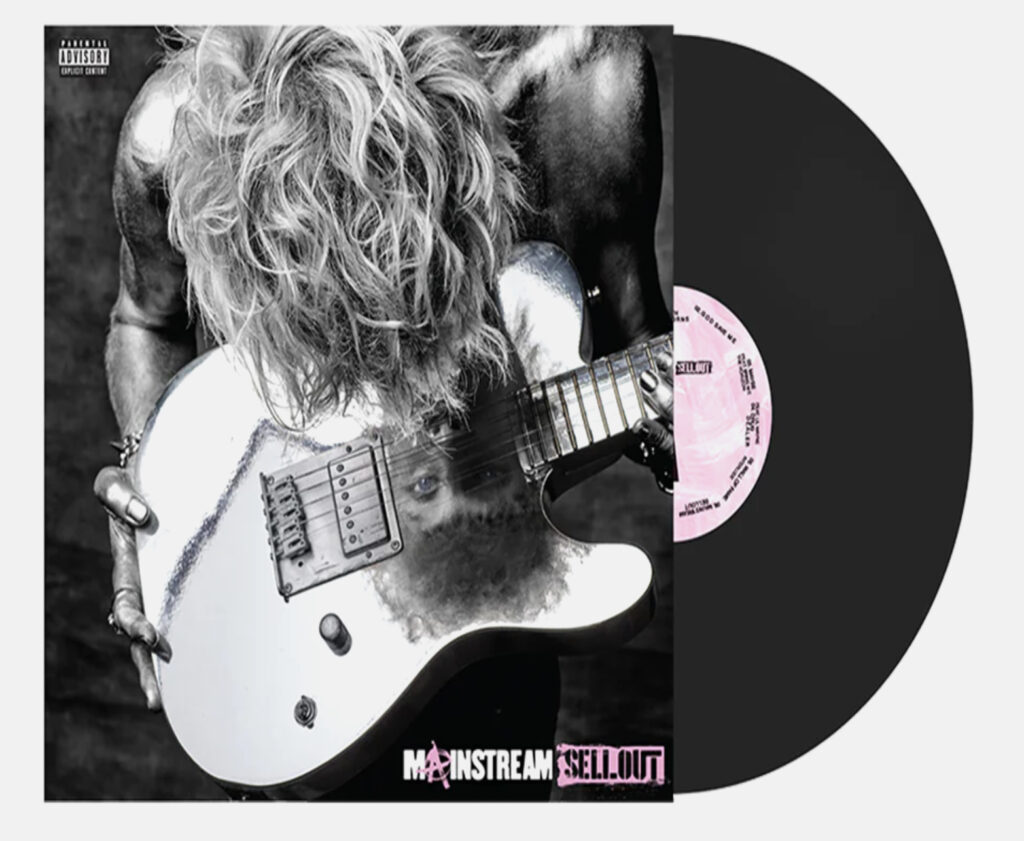When Machine Gun Kelly released Mainstream Sellout in 2022, it was clear he was no longer just the rapid-fire rapper from Cleveland trying to punch his way into hip-hop’s upper echelons. No — this was a conscious collision course with a different kind of rebellion, one framed not by trap beats but by guitar riffs, self-sabotage, and messy, cinematic self-exposure. Mainstream Sellout — especially in its vinyl edition — captures the rawness and artifice of MGK’s turn to pop-punk with an immediacy that streaming simply can’t replicate.
There’s something almost poetic about the act of pressing this album onto vinyl. Mainstream Sellout is about nostalgia as much as it is about identity crisis: the vinyl format, dusty and tangible, becomes a perfect companion to Kelly’s sonic retreat into early-2000s angst and eyeliner. In this form, the album feels less like a curated Spotify playlist and more like a physical diary — a confessional trapped under a heavy stylus.
From Underground Anthems to Arena Angst
By the time he reached Mainstream Sellout, Machine Gun Kelly — born Colson Baker — had already charted an unusual path. His earlier work, notably albums like Lace Up and General Admission, cemented him as a motor-mouthed underdog in rap. But when he traded rap for pop-punk with Tickets to My Downfall (2020), many critics — and fans — accused him of abandoning his roots. That pivot was as calculated as it was vulnerable. Tickets soared commercially, and Mainstream Sellout followed, doubling down on the same neon grunge aesthetic.
The vinyl version packages this evolution in a way that feels intentional. The heavier grooves, the occasional analog imperfections — they ground the high-gloss dramatics of tracks like “emo girl” and “papercuts” in something dirtier, more authentic. On vinyl, Mainstream Sellout sounds less like a calculated genre switch and more like a messy, inevitable unspooling.
The Sonic Architecture of a Crisis
At its core, Mainstream Sellout is an album about feeling misunderstood, about clawing for catharsis even while courting spectacle. Songs like “Maybe” (featuring Bring Me the Horizon) and “5150” tremble with dissonance, shifting between polished choruses and cracked verses. There’s a conscious theatricality to Kelly’s delivery: he often sings as if he’s shouting down a stadium-sized void, desperate to be heard but also daring the audience to misunderstand him.
On vinyl, these dynamics grow sharper. The analog warmth accentuates the grimy edges of Travis Barker’s frenetic drumming. The guitars feel heavier, the spaces between verses more pregnant with static. Even slicker tracks like “Make Up Sex” acquire a strange weight when heard through a record player — their candy-coated nihilism becomes something closer to real despair.
It’s easy to criticize MGK for his sometimes-blunt lyricism, his reliance on pop-punk clichés. Yet Mainstream Sellout on vinyl reveals a different reading: this is not an artist hiding behind tropes but a man burrowing into them, trying to find some sort of bruised self-recognition in the chaos.
Aesthetic as Emotional Armor
The visual packaging of Mainstream Sellout vinyl deserves as much attention as the music. The standard pressing features MGK with his signature pink guitar, surrounded by surrealist imagery: bandages, pills, pixelated sadness. Limited edition pressings push the aesthetic even further — including neon splattered vinyl, graffiti-inspired sleeves, and photo inserts that walk a line between polished rockstar mythology and Hot Topic pastiche.
This packaging is more than a marketing move; it’s part of the album’s emotional economy. MGK is self-aware about the accusations of “selling out” — he named the album after them, after all. In embracing pop-punk’s commercialization and suburban angst, he also exposes it: how much of rebellion is performance? How much pain is packaging?
On vinyl, holding the album in your hands, that question feels less cynical and more poignant. The textures — glossy inserts against matte sleeves, the slight crackle of the needle — mirror the tension within the album itself, between artifice and sincerity, between product and confession.
The Machine Gun Kelly Mythos
Listening to Mainstream Sellout on vinyl also invites a broader reflection on MGK’s place in contemporary music. He is a polarizing figure, easy to mock, easy to dismiss — but that misses the deeper arc of his career. Like artists before him who blurred genre boundaries (think Kid Cudi, think Post Malone), MGK is less interested in purity than in rupture. He weaponizes genre-hopping as a kind of emotional survival.
The album’s guests — blackbear, Lil Wayne, Willow Smith — embody that same fluidity. Their appearances feel less like traditional features and more like extensions of MGK’s fractured psyche: different voices echoing the same restless hunger.
On vinyl, where the listening experience demands patience and presence, these collaborations feel more cohesive, like stations on a late-night emotional road trip rather than scattered Spotify cameos.
A Love Letter to Teenage Melodrama
Ultimately, Mainstream Sellout is not trying to innovate pop-punk. It’s not a genre revolution. It’s a love letter to teenage melodrama, written by a man who knows he should be past it but can’t quite let it go. It’s in this contradiction that the album finds its strange, aching beauty.
The vinyl format heightens this nostalgia. It demands the kind of ritual that recalls a time before streaming: flipping sides, reading lyrics, staring at liner notes. It turns passive listening into active engagement. You don’t just hear Mainstream Sellout; you inhabit it, scratches and all.
Flow
Machine Gun Kelly’s Mainstream Sellout vinyl is, like the album itself, a beautiful mess. It is an artifact of self-reinvention, a snapshot of an artist sprinting headlong into another identity, even as the ground shifts beneath him. On wax, the album’s contradictions — its bravado and vulnerability, its slickness and grit — feel not just intentional but essential.
In an era of instant consumption, Mainstream Sellout on vinyl reminds listeners of the power of friction, of imperfections, of albums that beg to be wrestled with rather than streamed in the background. Machine Gun Kelly may or may not be a “sellout.” What’s clear, especially on vinyl, is that he’s an artist willing to bleed in public, even if the stage is made of pink plastic and broken dreams.
And somehow, that feels more punk than perfect rebellion ever could.
No comments yet.








